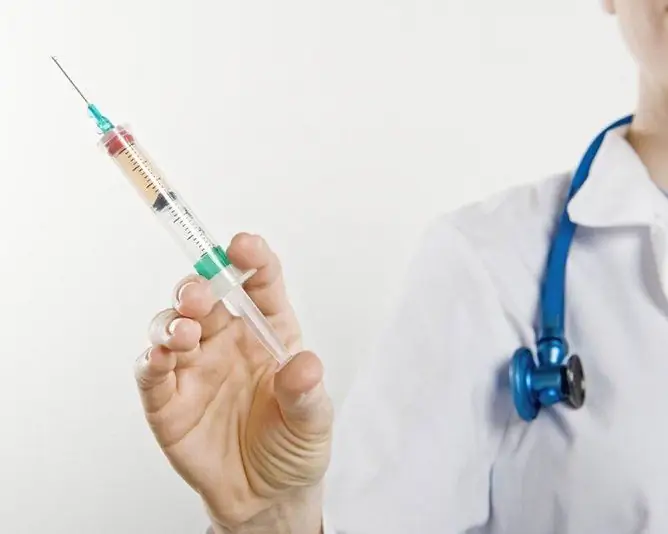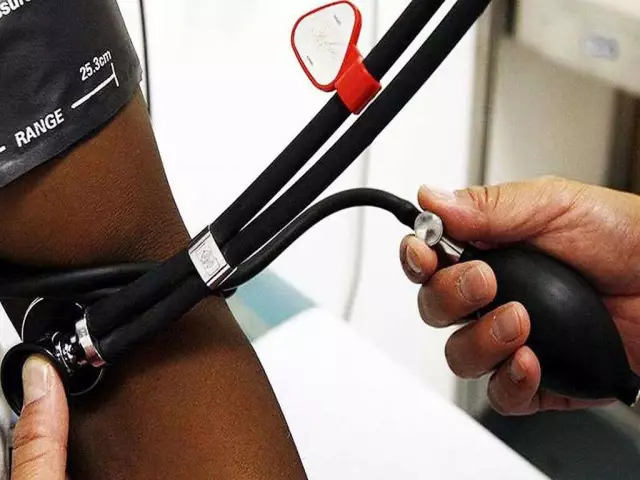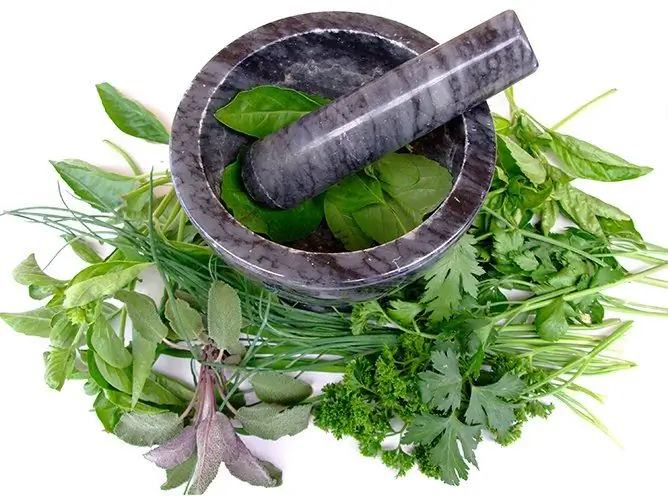- Author Rachel Wainwright wainwright@abchealthonline.com.
- Public 2023-12-15 07:39.
- Last modified 2025-11-02 20:14.
High blood pressure injections: treatment of hypertensive crisis
The content of the article:
- Is it possible to give high pressure injections by yourself
- What injections do emergency doctors give at high pressure?
- The name of the pressure drugs that are injected in the hospital
- Pressure pills or injections: which is better?
- Why it is necessary to reduce pressure
- Video
Pressure injections are a means that allows you to achieve a pronounced therapeutic effect very quickly, therefore they are used when emergency assistance is required, namely in case of a hypertensive crisis. As soon as the condition stabilizes, the patient is transferred to the tablet form of drugs.

Injection of drugs at high pressure should only be carried out by a medical professional
Is it possible to give high pressure injections by yourself
Approximately 1% of people with arterial hypertension periodically experience hypertensive crises. The crisis is characterized by a sudden acute increase in blood pressure (BP) with the appearance and rapid increase of symptoms of damage to the cardiovascular and nervous system, kidneys. If the patient is not given pressure-lowering injections, then he may develop serious complications:
- embolism or thrombosis of the arteries;
- stroke;
- acute renal failure;
- pulmonary edema;
- coma.
Therefore, in case of a hypertensive crisis, an ambulance should be immediately called to the patient. Individuals who do not have a medical education at home should not try to inject themselves from high pressure intramuscularly, and even more so intravenously. This is due to the fact that blood pressure should be lowered slowly and under medical supervision. If you lower it sharply, the risk of myocardial infarction and acute cerebrovascular accident (stroke) increases significantly.
Considering the above, it is necessary to emphasize once again that in case of a hypertensive crisis, you should urgently seek qualified medical help and in no case should you give yourself any injections.
What injections do emergency doctors give at high pressure?
Most often, patients with hypertension are injected intramuscularly with Papaverine with Dibazol and Analgin. Such a "cocktail" allows you to quickly bring down high blood pressure and relieves headaches well, contributing to the rapid improvement of patients' condition.

An injection of Papaverine with Dibazol and Analgin allows you to quickly reduce high blood pressure
The proportion of each of the listed drugs included in this "cocktail" is determined by the doctor individually in each case, based on the level of blood pressure, the general condition of the patient, his age, and the presence of concomitant pathology. Dibazol injections are contraindicated in women and men with diabetes. With caution, this drug should be prescribed in the following cases:
- age over 60;
- kidney disease with impaired function;
- glaucoma;
- peptic ulcer of the stomach and duodenum.
One of the best drugs for relieving high blood pressure is a 25% magnesium sulfate solution (Magnesia). This drug can be administered both intravenously and intramuscularly. When the drug is administered intravenously, there is a feeling of heat throughout the body, therefore Magnesia is often called a "hot injection". The intramuscular injection of magnesium sulfate is sharply painful, so the drug must be injected deep into the thickness of the gluteal muscle into the novocaine "pillow" (pre-injection of 0.25-0.5% novocaine solution).

Magnesia - an ambulance drug for hypertensive crisis
Magnesium sulfate acts on the walls of blood vessels, relieving their increased tone, which leads to a decrease in blood pressure. In addition, it helps to remove excess fluid from the body, eliminate edema.
The dosage of magnesium sulfate is determined only by a doctor! Self-medication with this drug is unacceptable, since excess magnesium ions have an adverse effect on the heart, disrupting the conduction of an electrical impulse, and cause disturbances in the rhythm of heart contractions (arrhythmia).
The name of the pressure drugs that are injected in the hospital
If, after the therapy, the patient's blood pressure remains significantly increased or he has signs of impaired coronary and / or cerebral blood flow, there is a need for hospitalization.
In the hospital, the patient is given antihypertensive treatment, which includes injections of drugs for pressure.

Labetalol - a drug for intravenous injection with high blood pressure
Labetalol is administered intravenously in a stream, repeating the injections every 10-15 minutes until the patient's condition is normalized. Side effects are: nausea, tachycardia, increased severity of signs of heart failure, heart block, orthostatic collapse, bronchospasm.
Clonidine (clonidine) is administered intravenously. With a rapid introduction, bradycardia, arterial hypotension may develop.

Naniprus must be administered intravenously very slowly.
Naniprus (sodium nitroprusside) - used only for very slow intravenous administration. Its side effects can be shortness of breath, tachycardia, loss of consciousness, severe arterial hypotension.
Nitroglycerin is slowly dripped into a vein. Against the background of its use, the patient may experience nausea, severe headache, tachycardia.

Nitroglycerin - high pressure ambulance
Diazoxide - when administered intravenously, provides a quick healing effect. It can lead to the development of side effects: edema, hyponatremia, hyperglycemia (with repeated administrations), nausea and vomiting, angina pectoris, tachycardia, arterial hypotension.
If indicated, patients are given other injections:
- Furosemide is a diuretic that helps to remove excess fluid from the body, eliminating edema;
- Eufillin - reduces the tone of the walls of blood vessels, relieves spasm of the bronchi (should be used with caution in patients suffering from insufficiency of coronary blood flow);
- Propranol (Anaprilin) - lowers blood pressure, has an antiarrhythmic effect;
- Relanium - has a pronounced tranquilizing effect, helps to eliminate the feeling of fear and anxiety in patients;
- Phentolamine - used in the case of arterial hypertension caused by pheochromocytoma;
- Apressin (hydralazine) - indicated for malignant hypertension and a combination of hypertension with renal failure.
Pressure pills or injections: which is better?
High blood pressure injections have a quick and pronounced therapeutic effect. However, doctors are against their frequent use due to the fact that they often lead to the development of a number of serious side effects. In addition, the hypotensive effect after injection is usually short-lived. Therefore, any injection from pressure should be considered solely as an ambulance.
In hypertension, in order to prevent the occurrence of heart attacks and strokes, it is very important to control the level of blood pressure, preventing sharp fluctuations. It is more convenient to do this with the help of tablet forms of antihypertensive drugs. There are a lot of them, we will not list all their names. This is not necessary, since for each patient the doctor selects pressure pills individually, taking into account the cause of the disease, its duration and severity, the presence or absence of concomitant pathologies.
Many modern antihypertensive drugs have a prolonged effect and are taken 1-2 times a day. As practice shows, with the correct medication (adherence to the regimen and dose), blood pressure in patients does not rise above 140/90 mm Hg for a long time. Art. and, accordingly, they do not need to inject drugs against pressure.
Why it is necessary to reduce pressure
Arterial hypertension is a widespread disease. According to medical statistics, about 20-30% of people aged 40 and older face the problem of high blood pressure. A few decades ago, arterial hypertension was mainly observed in the elderly, now it is often found even in adolescents.
With an increase in blood pressure, a person's well-being worsens significantly. He has complaints of headache, nausea, decreased performance. With long-term high blood pressure, the blood supply to the brain and internal organs is disrupted, their function suffers, which can lead to serious consequences for the body.
Video
We offer for viewing a video on the topic of the article.

Elena Minkina Doctor anesthesiologist-resuscitator About the author
Education: graduated from the Tashkent State Medical Institute, specializing in general medicine in 1991. Repeatedly passed refresher courses.
Work experience: anesthesiologist-resuscitator of the city maternity complex, resuscitator of the hemodialysis department.
Found a mistake in the text? Select it and press Ctrl + Enter.






